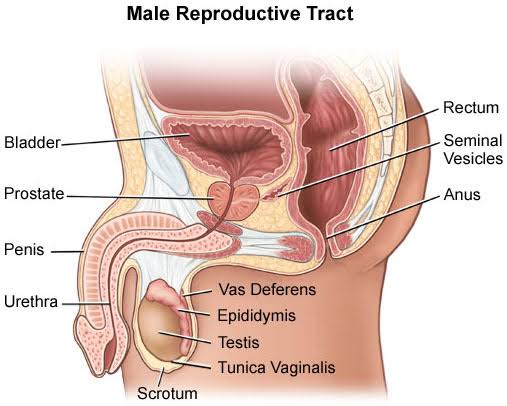Here are the early signs to watch out for that show a lot may be wrong with your prostate. What Men should Know, why women should care, according to expert, Doctor Omotuyi Mebawondu during the questions and answers session on Platforms Africa weekly e-Discourse. Excerpts:-
What is prostrate in the body and why should its infection or enlargement be an issue?
The prostate is a walnut-sized gland located between the bladder and the penis. The prostate is just in front of the rectum, the upper part of the anus. The urethra or urine pipe runs through the center of the prostate, from the bladder to the penis, letting urine flow out of the body.
The prostate secretes seminal fluid that nourishes and protects sperm. During ejaculation, the prostate squeezes this fluid into the urethra, and it’s expelled with sperm as semen.
The prostate has 3 main functions. The most important is producing seminal fluid, which is a component of semen.
It also plays a role in hormone production and helps regulate urine flow.
Do women need information about prostate?
Yes.
They are very relevant to family structure and stability either as wife, mother, or sister.
Prostate infection can be a factor in infertility which is important to a married couple
Urinary obstruction exert a lot of cost on the family finance especially if it occurs during the retirement age. This is made worse by high oophe (out of pocket health expenses) in Africa.
Prostatic surgery and drugs can worsen erectile dysfunction in man, thus causing emotional stress in the family.
Do all enlargement of Prostate lead to cancer?
Prostate size increases as one ages. Not all prostate enlargement are cancer. Common cause of such enlargement include chronic infection of the prostate called Prostatitis, Benign Prostatic Hyperplasia and Prostate Cancer.
No doubt the key change to watch out for is the cancerous change in the prostate. However, significant health problems result when the size of prostate increases to obstruct flow of urine as in BPH
Men above 40 and prostate problems.
During the first half of your life, you may hardly know your prostate is there. A healthy prostate goes about its business without drawing a lot of attention to itself.
As you age, though, things often change. Starting around age 25, the adult prostate begins to enlarge slowly, and it has nothing to do with cancer.
Around age 50, many men begin to have uncomfortable symptoms as a result of this enlargement. They may have to go to the bathroom more urgently and often, especially at night — and when they do, it’s often difficult to get a strong stream started or to empty the bladder completely. Sometimes this can lead to complete blockage of urinary flow and medical emergency.
Urinary problems caused by BPH are known as lower urinary tract symptoms, or LUTS. Men with LUTS often have problems in the bedroom as previously mentioned.
The link between LUTS and sexual problems is not fully understood. But many of these men have a lowered sex drive, trouble maintaining an erection, and they’re less satisfied with sex. Depression, loss of sleep due to frequent nighttime trips to the toilet, or some related physical cause may play a role.
Whatever the reason, the worse LUTS get, the more trouble a man may have in the bedroom. The good news is that this can be treated.
Blacks Africans and prostate issues
Black men don’t just get this disease more often than white men. They also tend to get it at an earlier age. And their cancer tends to spread more quickly.
Here are some factors that lay he responsible
1. Genetics. There are likely genetic components
2. Poor attitude to health care. Delayed health screening and lack of access to quality and comprehensive health care. Refusal to embrace novel treatment and clinical trial
3. Environmental factors, non healthy health styles, ignorance and denials. Occurrence of additional co-morbidity.
READ ALSO: Lies People Aged 40 and Above Believe about Their Health + Risk, Danger
Why Men Don’t Usually Survive Breast Cancer – Medical Expert
Why Malaria, Killer of 430,000 People Yearly, Will Kill More In Africa
How Healthy Diet Can Surpress Disease, Wasteful Spending on Medicine
Do Not Wear Pant, Bra for More than 24 hrs — Expert Warns Women
6. Causes of prostate enlargement and cancer.
The causes of bph and cancer are generally unknown. But hormonal changes in man as he grows has been implicated.
Here are some risk factors
1. Age. The risk of prostate cancer increases with age, especially after age 50. Around 60% of prostate cancers are diagnosed in people who are 65 or older
2.Race. Like I mentioned earlier, black men are more likely to develop prostate diseases earlier, experience more aggressive variant and die. Hence we need to pay more attention to prostate health.
3. Family history. Prostate cancer that runs in a family, called familial prostate cancer, makes up about 20% of all prostate cancers. This type of prostate cancer develops because of a combination of shared genes and shared environmental or lifestyle factors. So if you have a family with diagnosed prostate cancer, you need to pay more attention to yours.
5. Lifestyles and some chemicals
Sedentary lifestyle, alcohol consumption, obesity and exposure to some chemicals can be risk factors.
Signs and symptoms
Prostate enlargement or cancer may be asymptomatic and can manifest as an advanced disease.
Early warning symptoms of enlarged prostate gland include
– Dribbling urine, this refers to continuing dropping of urine with prolonged voiding (urination) time
– Pain or burning during urination
– Frequent urination and feeling of non-emptying of the bladder
– Blood in the semen or urine
– Frequent pain or stiffness in the lower back, hips, pelvic or rectal area, or the upper thighs
– Urinary incontinence (the inability to urinate)
– Painful ejaculation
– Loss of interest in sexual pleasures
If you have symptoms, please don’t panic. Just get an expert opinion
Effects of prostate enlargement or Cancer.
Prostatism historically applied to almost all symptoms of micturition disorder in older men
Lower urinary tract symptoms (LUTS) applies to any patient with urinary symptoms which include
Frequency, urgency, nocturia
Hesitancy, straining, slow stream, intermittent or interrupted flow, terminal dribbling, sensation of incomplete emptying
All these leads to reccuring infection, loss of sleep, back pressure on the bladder and kidneys, low libido and financial loss from frequent hospital visits.
In some cases, the flow of urine can be blocked.
Prostate cancer can spread to other parts of the body.
These include urinary retention (acute and chronic), haematuria, urinary tract infection, bladder stones, bladder wall damage, renal dysfunction, incontinence and erectile dysfunction. Recognition of the complications of BPH/BOO early allows more effective management of these complications.
e-Discourse is a weekly enlightenment programme of Platforms Africa, an e-Community of intellectuals, policy moulders and opinion leaders in Africa created by Adeola Yusuf





